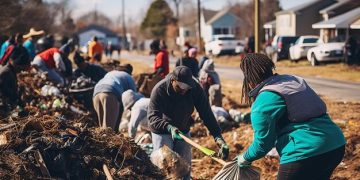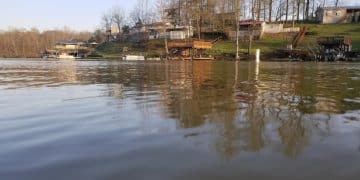Long-Term Psychological Effects of Displacement on US Communities

Long-term psychological effects of displacement on US communities include increased rates of PTSD, depression, anxiety, and substance abuse, alongside disruptions in social networks and cultural identity, impacting overall community well-being and cohesion.
Displacement, whether due to natural disasters, economic shifts, or social upheaval, can have profound and lasting impacts on the mental health of those forced to leave their homes and communities. This article explores what are the long-term psychological effects of displacement on US communities, shedding light on the challenges faced and the pathways to recovery.
Understanding Displacement and Its Psychological Toll
Displacement involves the involuntary movement of people from their homes or regions, often due to factors beyond their control. The experience can be deeply traumatic, leading to a range of psychological challenges that persist long after the initial event.
Recognizing the scope and nature of these psychological effects is crucial for developing effective support systems and policies that address the long-term needs of displaced communities.
Defining Displacement
Displacement encompasses various scenarios, including natural disasters, economic downturns, urban development projects, and instances of social or political conflict. Each type of displacement brings unique challenges but shares common threads of loss and disruption.
Common Psychological Reactions to Displacement
Initially, displaced individuals may experience shock, disbelief, and intense emotional distress. Over time, these reactions can evolve into more persistent mental health conditions, such as post-traumatic stress disorder (PTSD), anxiety, and depression.
- Increased rates of depression and anxiety.
- Higher likelihood of substance abuse and dependence.
- Elevated risk of suicidal ideation.
- Development of chronic stress-related health problems.
The psychological impact of displacement can be particularly severe for vulnerable populations, including children, the elderly, and individuals with pre-existing mental health conditions. These groups often require targeted interventions to mitigate the long-term effects of displacement.
Post-Traumatic Stress Disorder (PTSD) in Displaced Communities
PTSD is a significant concern among displaced populations, as the circumstances leading to displacement often involve traumatic experiences. The symptoms of PTSD can be debilitating, affecting an individual’s ability to function and thrive.
Understanding how PTSD manifests in displaced communities and implementing evidence-based treatments is essential for promoting recovery and resilience.

Symptoms of PTSD Among Displaced Individuals
Displaced individuals with PTSD may experience flashbacks, nightmares, and intrusive thoughts related to the displacement event. They may also exhibit avoidance behaviors, emotional numbing, and heightened arousal, making it difficult to engage in daily activities.
Risk Factors for Developing PTSD
Several factors can increase the risk of developing PTSD following displacement, including the severity of the initial trauma, the level of social support available, and pre-existing mental health vulnerabilities.
- Exposure to violence or loss during displacement.
- Lack of adequate shelter, food, and medical care.
- Separation from family members and social networks.
Early intervention and access to specialized mental health services are crucial for preventing the development of chronic PTSD and improving outcomes for displaced individuals.
The Impact on Social Structures and Community Bonds
Displacement not only affects individual mental health but also disrupts social structures and weakens community bonds. The loss of familiar surroundings, social networks, and cultural traditions can lead to feelings of isolation and alienation.
Rebuilding social connections and fostering a sense of belonging are vital for promoting community healing and resilience in the aftermath of displacement.
Loss of Social Networks
Displacement often scatters community members, severing the ties that provide emotional support and practical assistance. Re-establishing these networks in new locations can be challenging, particularly for those who lack resources or face language barriers.
Erosion of Cultural Identity
Displacement can also lead to the erosion of cultural identity, as displaced individuals may struggle to maintain their traditions and customs in unfamiliar settings. This loss can contribute to feelings of rootlessness and disconnection.

- Community-based support groups and social activities.
- Cultural preservation efforts and intergenerational programs.
- Opportunities for civic engagement and leadership development.
By investing in programs that promote social cohesion and cultural preservation, communities can help displaced individuals rebuild their lives and reclaim their sense of identity.
Economic Hardship and its Psychological Sequelae
Displacement often leads to economic hardship, as individuals may lose their jobs, businesses, and access to essential resources. The stress and uncertainty associated with financial instability can exacerbate psychological distress and hinder recovery.
Addressing the economic needs of displaced communities is essential for promoting mental health and well-being.
Job Loss and Financial Instability
Displaced individuals may face significant barriers to employment, including lack of job skills, discrimination, and licensing requirements. The resulting financial strain can lead to increased stress, anxiety, and depression.
Housing Insecurity
Securing safe and affordable housing is a major challenge for many displaced families. The lack of stable housing can create additional stress and instability, further undermining mental health.
Access to job training programs, financial assistance, and affordable housing options can help displaced individuals regain economic stability and improve their psychological well-being. Support programs that can also aid immigrants and refugees can be found at USAHello.
The Role of Mental Health Services and Support
Providing access to quality mental health services is crucial for addressing the long-term psychological effects of displacement. These services must be culturally sensitive, trauma-informed, and tailored to the specific needs of displaced communities.
Integrating mental health care into broader humanitarian and recovery efforts can help ensure that displaced individuals receive the support they need to heal and rebuild their lives.
Types of Mental Health Interventions
A range of mental health interventions can be effective in treating the psychological effects of displacement, including individual therapy, group counseling, and medication management. Culturally adapted interventions are particularly important for reaching diverse populations.
Overcoming Barriers to Access
Many displaced individuals face barriers to accessing mental health services, including language barriers, lack of insurance, and stigma. Addressing these barriers requires innovative approaches, such as mobile clinics, telehealth services, and community-based outreach programs.
- Funding for mental health services in displaced communities.
- Training for mental health professionals on trauma-informed care.
- Public awareness campaigns to reduce stigma.
By investing in accessible and culturally responsive mental health services, communities can help displaced individuals overcome the psychological challenges of displacement and build a brighter future.
Building Resilience and Promoting Recovery
Resilience is the ability to bounce back from adversity and adapt to challenging circumstances. Fostering resilience in displaced communities is essential for promoting long-term recovery and well-being.
Creating supportive environments, promoting social connections, and empowering individuals to take control of their lives can help build resilience and facilitate healing.
Strategies for Fostering Resilience
Several strategies can help foster resilience in displaced communities, including promoting self-care, building social support networks, and engaging in meaningful activities. These strategies can empower individuals to cope with stress and adversity.
Community-Based Initiatives
Community-based initiatives play a vital role in promoting resilience and recovery. These initiatives can provide opportunities for social interaction, skill-building, and civic engagement, fostering a sense of belonging and empowerment.
- Establishing community gardens and recreational spaces.
- Organizing cultural events and celebrations.
- Creating mentorship programs for youth.
By working together to build resilient communities, we can help displaced individuals overcome the long-term psychological effects of displacement and create a more just and equitable society.
In conclusion, the long-term psychological effects of displacement on US communities are multifaceted and far-reaching, requiring comprehensive and coordinated efforts to address. By understanding the challenges faced by displaced individuals and investing in evidence-based solutions, we can help them heal, rebuild their lives, and contribute to the strength and vitality of our communities.
| Key Point | Brief Description |
|---|---|
| 💔 Loss and Grief | Displacement often results in significant loss, including homes, communities, and loved ones. |
| 🌱 Resilience Building | Supporting community initiatives that foster resilience and social support is vital for recovery. |
| 🏥 Mental Health Access | Accessible and culturally sensitive mental health services are crucial for addressing trauma and promoting healing. |
| 💰 Economic Stability | Addressing economic hardship through job training and financial assistance can improve overall well-being. |
Frequently Asked Questions (FAQs)
▼
The primary long-term effects include PTSD, depression, anxiety, and substance abuse, often accompanied by feelings of loss, isolation, and cultural disruption.
▼
Displacement disrupts existing social networks, leading to isolation and loss of cultural identity. Rebuilding these bonds is crucial for community healing.
▼
Mental health services offer crucial support through therapy, counseling, and medication management, addressing trauma and fostering resilience among displaced individuals.
▼
Strategies include promoting self-care, fostering social support networks, and engaging in meaningful activities to empower individuals to cope with adversity.
▼
Communities can offer job training programs, financial assistance, and affordable housing options to help displaced individuals regain economic independence and stability.
Conclusion
The enduring psychological repercussions of displacement on US communities necessitate comprehensive and collaborative interventions. By acknowledging the challenges encountered by displaced individuals and committing to evidence-based approaches, we can facilitate healing, enable them to reconstruct their lives, and enhance the overall resilience of our communities.





